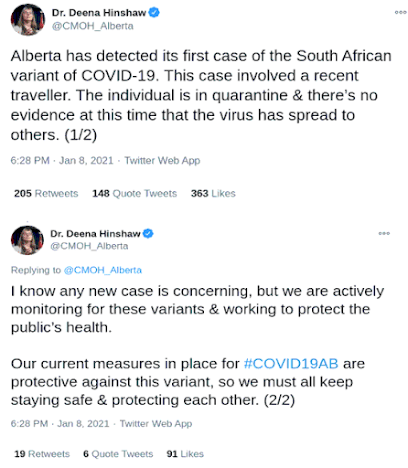#15,695
While we aren't even ten days into the new year, the word `variant' already looks like a slam dunk for the word of the year for 2021. Admittedly there are literally hundreds of COVID variants around the globe, but luckily most convey no special advantage to the virus, and are of little consequence.
But over the past month three variants, seemingly spawned independently in the UK (B.1.1.7), South Africa (501Y.V2) , and South America (E484K), have taken center stage.
All three appear to have a transmissibility advantage, while two of them (501Y.V2 and E484K) carry a mutation that has previously been linked to potentially reduced antibody recognition, which in turn may decrease immune protection acquired from prior infection or vaccination.
Given the rapid proliferation of the SARS-CoV-2 virus, and our meager genomic surveillance, it is possible there are other variants of concern (VOC) out there that haven't been identified yet. Others could emerge in the future, as viral evolution never stops.
For now, the biggest impact we've seen has come from the B.1.1.7 variant, which is thought to be the driving force behind the UK's recent surge in COVID hospitalizations (see London Mayor Declares `Major Incident' As COVID Cases Rise).
B.1.1.7 has already been detected in more than 40 countries (see Australia: Brisbane To Enter 3-Day Lockdown Over Detection Of COVID B.1.1.7 Variant Virus). Concerns over further international spread of this variant have led many countries to ban or restrict travel (see here, here and here).
While less well distributed, the 501Y.V2 variant first reported from South Africa runs a close second on our variant worry list, as there are persistent (but as yet, unproven) concerns that it may be less susceptible to antibody treatments and/or the vaccine.
Like the South American variant, 501Y.V2 carries the E484K mutation, which some fear may make it a bigger threat in the long run (see PrePrint: Genomic Evidence of a Sars-Cov-2 Reinfection Case With E484K Spike Mutation in Brazil).
While well established in South Africa, we've seen only a handful of reports of 501Y.V2 elsewhere. But overnight Dr. Deena Hinshaw, CMO of Alberta Health Canada, tweeted the announcement of their first detection of this variant.
Over the past couple of weeks Canada has reported 14 B.1.1.7 variants, and the United States updated their variant count yesterday to 63 across 8 states. Given the lack of surveillance, both are likely significant undercounts.
A month ago, B.1.1.7 wasn't even on our radar. Today it is a growing crisis around the globe. Similarly, 501Y.V2 is just beginning its world tour. Whether it can compete successfully with the B.1.1.7 variant remains to be seen.
But these two variants are unlikely to be the last curveballs that COVID throws at us.
Stay tuned.

